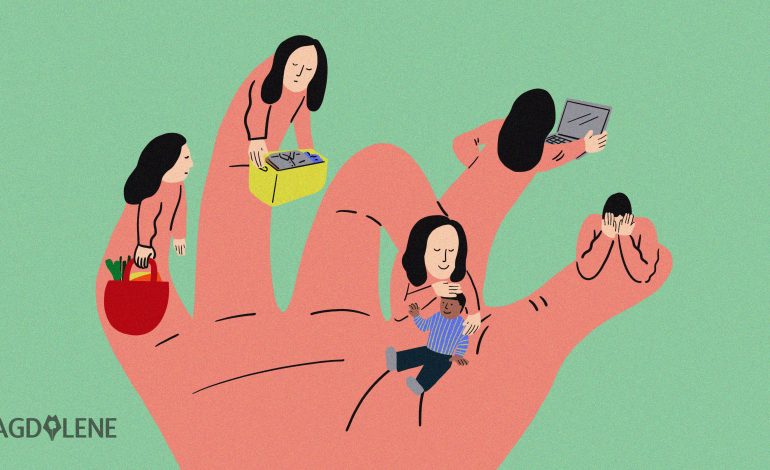As Long as Hubby’s Happy: Legal and Financial Challenges of Women Businessowners

Long before the rowdy roosters announced the arrival of dawn, “Maria” was already busy in her kitchen. She had to prepare the ingredients for the croquettes she was selling while at the same time also preparing breakfast for her two school-age children, 9 and 11.
At around half past six, the 40-year-old mother would set out to bring her children to schools. On her return home, she immediately started to fry and package her croquettes before delivering them to several stalls around her home in Surabaya, East Java.
Once back home, she immediately had to prepare lunch. Then at around three in the afternoon, she started to make the rounds of the stalls to collect the proceeds from the sales of her croquette and took notes of any order for them for the next day.
Before dusk was the time she did her shopping, buying ingredients for her croquettes for the next day. Her early evenings were occupied cutting and preparing the vegetables and other ingredients for her croquettes that she would store in the fridge. Nine o’clock in the evenings usually marked the end of her day, and she could retire to her bedroom.
This had been Maria’s daily routine for more than two years. She started her business selling croquette with a friend an also neighbor, and it gave her extra income besides her main occupation as a part-time mortician. This extra money could come handy whenever things were going rough with her husband. Their relationship had not been good for some time.
When Maria started her business, her husband disapproved arguing that he was afraid she would not be able to manage her time between the business and her house chores.
“I am not officially a single mother, but I have experienced the worst impact of my husbands infidelity, when I had to work really hard to just make Rp 40,000 (about US$2.80). We may be together again now, but the trauma remains. That is why I opened the business so that I could have some income, just to be on the safe side,” she said.
Her croquette business was actually growing, and in February last year, she managed to clinch a large order for a government event. This was good news for Maria and her neighbor, and they saw the need to make their croquettes more attractive and look more “official” by improving on the packaging and providing it with a nice label. So off they went to seek a bank loan.
After completing all the required documents, including family registration card, identity cards and financial reports, they went to the bank to ask for a Rp 5 million loan with a motorcycle as a collateral. Looking at their business’ impressive daily turnover of around Rp 200,000-Rp 300,000 the bank initially responded positively, and they even interviewed her at her home business site.
But a day later came the bad news. Her application was declined. “Their reason was that there was no permission from my husband. With my friend, we were surprised because we were not asked for that permission when we were applying,” Maria said.
Unwilling to give up easily, Maria then applied for a loan at the Madani Business Cooperative. But the result was the same: denied because of the absence of a husband’s permission.
“What if my husband is unemployed and cannot provide for me, and I need capital for my business?” she asked.
The officer responded: “You can get a loan, but it would be difficult, Madam. There will a lot of surveys to convince our surveyors.”
“I am not officially a single mother, but I have experienced the worst impact of my husbands infidelity, when I had to work really hard to just make Rp 40,000 (about US$2.80). We may be together again now, but the trauma remains. That is why I opened the business so that I could have some income, just to be on the safe side,” she said.
Disappointed, annoyed, and sad, Maria then opted to drop the option of seeking a loan, and just keep saving to get the capital she needed. Unfortunately, life had another plan. Maria now no longer sells croquettes, and her business partner has had to move away to follow her husband. Instead, Maria now works for a plastic factory in Surabaya.
“(I hope that) the bureaucratic requirements will be made easier and will favor women who want to become independent. We work for our family and help our husband. Independent women provide a strong foundation for the following generations,” said Maria.
Also Read: The Real Problems Behind Telling Women to Be Confidence
Trapped by the Regulation on “Joint Asset”
The Law on Banking, the regulations of the Authority on Financial Services, and the central bank Bank Indonesia have no specific regulation that requires that a loan application needs to include permission from a spouse, a husband or a wife. But in relations to asset guarantees, the Law on Marriage stipulates that everything that is gained after a marriage becomes a joint possession. And that is why Maria needs her husband’s consent because under the law, they are still bound together.
In legal fiducia documents, putting a movable object as a guarantee requires the signature of the spouse because the object is seen as a joint asset. Therefore, banks would not issue a loan without a spousal consent. Exception is given if the couple has a prenuptial agreement that clearly separates their assets or if a divorce has taken place.
Lawyer and activist Sri Agustine said that the legal and administrative system in Indonesia is, on paper, gender neutral and does not favor any side. However, the sociocultural factor that remains patriarchal fails to take into considerations the difficult situation faced by women.
What Maria went through actually falls under gender discrimination in financial administration because her experience as a woman who has been neglected by her husband, but who is not legally divorced, has failed to become an administrative consideration.
“(I hope that) the bureaucratic requirements will be made easier and will favor women who want to become independent. We work for our family and help our husband. Independent women provide a strong foundation for the following generations,” said Maria.
Single mothers who are un-divorced are, in fact, hardly documented in statistics. According to the Annual Notes of the National Commission on Women in 2021, the number of divorces declined during the pandemic because of the limited services of the religious court. That means that many women could not process their divorces among others because they could not file an official request for divorce during the ongoing pandemic.
Even prior to the pandemic, the number of un-divorced single mothers were hard to keep track of because of constraints in the methods of research. A report of the Women’s World Banking shows that although women manage family finance, their capacity and skill are often limited. This is caused by rigid gender norms and patriarchal culture that do not place women’s role as the main breadwinners.
Many practitioners in the financial sector still have gender bias. “The officers and the enforces are still biased and are not yet gender sensitive, so they deny women their rights related to state administration or other rights,” Agustine told Magdalene.
Agustine said regulations that hindered the independence of women socially or economically, like that encountered by Maria could be classified as a form of structural impoverishment of women.
“Although there has been a lot of changes to improve women’s welfare, the domestication of women continues to take place, creating a gap in economic participation between women and men,” she said.
Also Read: From Recruitment to Career Path How Gender Bias Affect Womens Career
The Financial Gap Facing Women
Indonesia has the Regulation of the Finance Minister Number 10 of 2009 on the People’s Small Credit Loan Facility – a revised version of Regulation of the Finance Minister Number 135 of 2008 – that encourages banks to channel credits to micro, small and medium enterprises (UMKM) regardless of their gender. Data of the Organization for Economic Co-operation and Development (OECD), showed that both men and women in Indonesia already had equal access in the financial sector in the sense that genders are not a consideration in applications for loans.
However, a report on Women’s Economic Empowerment and Financial Inclusion in Indonesia (2021) found that a financial gap between the genders actually exist. Although women are commonly the managers of household finances, many Indonesian women have to seek their husband’s permission to work, to make a financial expenditure and in applying for a loan. These were influencing their financial freedom and independence. Women are positioned as the sole caretaker of domestic chores, managing the household and the family.
Katadata cited the International Finance Corporation as having recorded that 80 percent of credit applications filed by women were unprocessed. A research on Gender Bias in Accessing Banking Credits among Micro and Medium Scale Entrepreneurs in Salatiga by Linda Ariany Mahastanti from the Satya Wacana Christian University also found that women were still facing gender bias from banks, such as not being trusted when they apply for credits.
“Banks tend to see women’s businesses as presenting a higher risk and therefore application would be denied or if accepted, the amount of the loan would be smaller than those accorded to men. This is also influenced by the relations between the banks and the women entrepreneurs,” Linda wrote.
Business consultant Queentries Regar meanwhile said that women micro entrepreneurs were facing financing constraints because their data would not appear in the bank’s bid data system. More than often, family assets, including properties and bank accounts, would be registered in the name of the husband. This explains why bank favors male clients more.
“Because women’s names are not shown in their database, it becomes difficult for the banks to verify whether the data is true, whether the business is legitimate. Therefore, the preference would tend towards men,” Queentries told Magdalene.
Women also tend to face movement restriction that impacts markets and sales efforts. “For example, one wants to sell things but cannot use any vehicle. Public transportation is not yet fully safe for women. This will eventually affect economic and entrepreneurial activities.”
These concerns cited by Queentries often influence banks’ decision to reject loan applications from women.
Economics and Business lecturer at Universitas Indonesia, Dewi Meisari Haryanti, believed that rather than regulative constraints, the main constraint to financial services was posed by the prevailing patriarchal culture.
“For example, when a husband seeks a loan, the wife commonly has no choice to but to agree. But when the wife wants to seek a loan, the husband has the power to reject it,” she said.
Haryanti said that because of the patriarchal system, women will also face constraints when wishing to open or develop a business because they legally do not possess any asset. Parents tend to leave the management of their assets to their sons while women, especially the young and single ones, are often left with no assets that could be used to meet banking requirements. Women need to get married so that they can borrow their husband’s assets.
“There is no regulatory framework that restricts women, the restriction comes from our culture,” said Haryanti.
She cited three things women believe that could hinder them from having a business. The first one is the fear of becoming successful, too busy, and eventually be pressured by their families. Secondly, feeling that they should not be more successful than their husband, and thirdly, the feeling that there was no need to fully develop the business since they could still rely on their husband as the main breadwinner.
Encouraging Gender Fair Regulations
Administrative difficulties were also experienced by Ika Yuliati, a handicraft entrepreneur in Yogyakarta when she wanted to update her tax number (NPWP) data because she had moved to another sub-district. During the process, the staff in charge asked her to put her husband’s tax number. This is a rare situation in Indonesia, where families are encouraged to have one tax number with women seen as being under the responsibility of their husband.
The fact is that when she and her husband, a construction businessman, got married, they had agreed to have separate tax numbers to avoid overlapping and to make it easier for each of them to manage their own business. Yuliati herself already had her own tax number before she got married, as she had been teaching at a local education institution, “I was surprised, and I had to ask why should I also state my husband’s tax number. What is the urgency for that? This is my personal tax number; shouldn’t a mere identity card and a family registration card suffice?” the 42-year-old told Magdalene.
The staff that handle her case told her that couples with separate tax numbers must also opt the status of meeting their tax obligations separately. Therefore, the husband’s tax number was needed.
Yuliati asked the same staff: “What if, for example, my husband wants to change his data? Does he have to also state his wife’s data?”
The reply was “No, it is not necessary.”
This regulation, according to Yuliati, indicated that a wife must obtain the permission of her husband, even if she had her own tax number.
“I told my husband about this, and he told me to just follow along so that it could be quickly completed. But I argued that the problem was that this was really discriminative. At the end my husband finally understood,” she added.
Agustine said that there was a cultural aspect that puts women lower in position to her husband after they get married. This is why a married woman must always obtain the permission from her husband, even when it concerns her own business. The result is that women not only face difficulties when building up her business and seek financing, but also in other vital affairs such as purchasing assets, properties and even getting a divorce.
“There is no regulatory framework that restricts women, the restriction comes from our culture,” said Haryanti.
Agustine, therefore, argued that decision makers in the financial sector must be more gender sensitive. “We need policies that are specific for women and laws that are gender responsive and gender-fair,” she said. “With a gender responsive planning, policies will be adjusted taking into consideration situations faced by women.”
Queentries added that gender responsive regulations in the development of micro businesses owned by women, could take the form of policies that require no collaterals such as houses or motorized vehicles but instead objects or assets owned by women such as agriculture equipment, agriculture products or livestock.
“For example, at) PNM Mekaar, specifically for women, no large collateral is sought from women because they recognize that women have more difficulties in providing them. The system is also based on shared liabilities,” she said. PNM Mekaar is a state-owned enterprise that deals in financial services. Mekaar is an acronym in the Indonesian language for Guidance for a Prosperous Family Economy, while PNM stands for National Civilian Capital.
Gender responsive regulations aside, Queentries suggested that the government trains staff and institutions providing capital so that they become more gender sensitive. When conducting interviews with women business owners, instead of focusing on the obstacles in dividing time for business and family, the questions should be on their ability to manage their business.
“Applying gender perspective is ideally the right thing to do and there should be an understanding that it is the right of all to get financial access,” she said.
This journalistic project is supported by Meedan, a non-profit organization in the field of technology that has the vision of strengthening digital literacy and global journalism.
This is the English version of the original version.






















